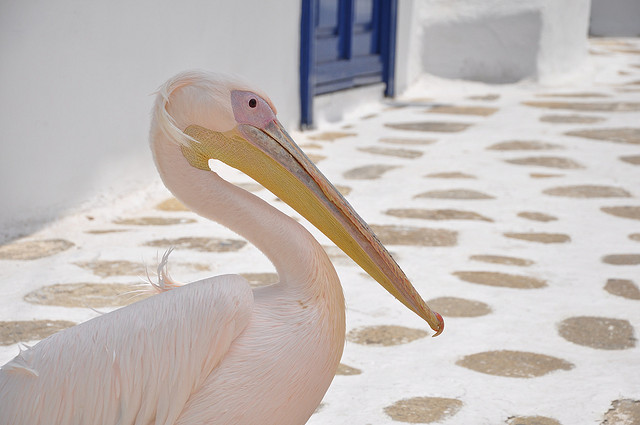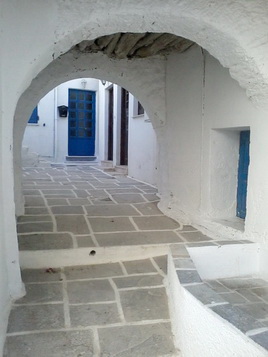Feminine nouns ending in – ος Posted by Ourania on May 13, 2014 in Grammar
Summer is on its way and my mind is travelling to the Greek islands. Before taking the ferry though, let’s do some grammar.
Some of the islands names end in –ος: Μύκονος (Mykonos), Ρόδος (Rodos, Rhodes), Ζάκυνθος (Zakynthos) etc. The nouns ending in –ος give Greek learners a hard time. When they find in a text a noun ending in –ος they usually think it’s masculine. However, there is a list of feminine and neuter nouns which also end in –ος. Some of these nouns are used every day, so it would be good to know how they are declined.
Explanation of terms and abbreviations
– Ενικός αριθμός (eneekos areethmos)= singular
– Πληθυντικός αριθμός (pleetheenteekos arithmos)= plural
– Ονομ. (ονομαστική, onomasteekee)= nominative
– Γεν. (γενική, geneekee)= genitive
– Αιτ. (αιτιατική, eteeateekee)= accusative
– Penultimate= the syllable next to the last
– Antepenultimate= the third syllable counting back from the end
Notes
When a feminine noun is stressed in the ending or the penultimate, the stress it kept over the same syllable in all cases. (See the declination of η ηθοποιός, η λεωφόρος below)
When a feminine noun is stressed in the antepenultimate, the accent moves to the penultimate in the genitive case (γενική, geneekee) in singular and plural and in the accusative (αιτιατική, aiteeateekee) in plural.
Declination examples
Below, you can see the declination of three feminine nouns ending in -ος:
η ηθοποιός (ee eethopeeos)= actress
η λεωφόρος (ee leoforos)= avenue
η έξοδος (ee exodos)= exit
|
Ενικός αριθμός (Enikos areethmos)
|
|||
| Oνομ.
Γεν.
Αιτ.
|
η ηθοποιός(ee eethopeeos)
της ηθοποιού (tees eethopeeou) την ηθοποιό (teen eethopeeo) |
η λεωφόρος(ee leoforos)
της λεωφόρου (tees leoforou) τη λεωφόρο (tee leoforo) |
η έξοδος(eeexodos)
της εξόδου (tees exodou) την έξοδο (teen exodo) |
|
Πληθυντικός αριθμός (Pleetheentikos areethmos)
|
|||
| Oνομ.
Γεν.
Αιτ.
|
οι ηθοποιοί(ee eethopeeee)
των ηθοποιών (ton eethopeeoon) τις ηθοποιούς (tees eethopeeous) |
οι λεωφόροι(ee leoforee)
των λεωφόρων (ton leoforon) τις λεωφόρους (tees leoforous) |
οι έξοδοι(eeexodee)
των εξόδων (tonexodon) τις εξόδους (tees exodous) |
Examples
- Μένουν στην οδό Σόλωνος. (Menoun stin odo Solonos) They live in Solonos street.
- Με δάγκωσε ο Πέτρος της Μυκόνου. (Me dagose o Petros tees Meekonou) Petros of Mykonos bit me.
- To καλοκαίρι θα πάω στη Σίφνο. (To kalokairee tha pao stee Seefno) I’ll go to Sifnos in the summer.
- Στην Ιταλία μιλούν πολλές διαλέκτους. (Steen Italia miloun polles dialektous) There are many dialects spoken in Italy (free translation).
- Άβυσσος η ψυχή του ανθρώπου! (Avisos ee pseehee tou anthropou) The human soul is an abyss!
- Η είσοδος είναι αριστερά. (Ee eesodos eenai aristera) The entrance is on the left.

Build vocabulary, practice pronunciation, and more with Transparent Language Online. Available anytime, anywhere, on any device.
About the Author: Ourania
Ourania lives in Athens. She holds a degree in French Literature and a Master’s degree in Special Education for Children. Since 2008, she has been teaching Greek to foreigners.






Comments:
Lindsey Meadows:
Why do so many names of Greek islands end in -os?